The desperate madness of Daniil Kharms
"If you want the audience to laugh, get on the stage and stay there silent until somebody laughs."
Hello,
Russian literature has a reputation for being heavy, serious, and dark. This reputation is appropriate, but not all-encompassing. Russian literature is wide enought to allow goofiness, weirdness, chuckles, and outright madness.
Russian life, however, is absolutely heavy, serious, and dark. And nobody embodies two of these aspects—darkness and goofiness—more than Daniil Kharms.
named him one of his influences, together with Groucho Marx and Monthy Python. Kharms probably never heard of the first one and died before creation of the second, but I think he would welcome this company. He was an absurdist poet and a children’s poet and writer. Here, I will write a summary of his biography and some diary entries, interspersed with his vignettes.This is going to get really weird, really fast.
NEW ANATOMY
A little girl had two blue ribbons growing from her nose. This case was especially rare because one ribbon had “Mars” written on it and the other, “Jupiter”.
1935His real name was Daniil Yuvachev. It is not fully clear how he came up with ‘Kharms’, but it might have been a combination of the words “charm” and "harm”. In 1924, he was expelled from his college for "poor attendance", "not participating in community service", and not "fitting into the class physiologically".
THE FOUR-LEGGED CROW
There once was a four-legged crow. Strictly speaking, it had five legs, but that's not worth mentioning. One day, the four-legged crow bought herself some coffee and thought, "Well, I bought myself some coffee, but what should I do with it?"
Then, as bad luck would have it, a fox was running by.
She saw the crow and shouted, “Hey, you, crow!”
And the crow shouted back, “You’re the crow yourself!”
And the fox shouted to the crow, “You, crow, are a pig!”
Distraught, the crow spilled her coffee. And the fox ran away. And the crow got down to the ground and walked on her four—or rather, five—legs to her miserable home.
February 13, 1938.Kharms’ father, Ivan Yuvachev, was a "narodovoletz", a member of a terrorist revolutionary group called “The People’s Will”. When Kharms was born, his father was already sentenced to fifteen years of hard labour. During the four years he spent in solitary confinement, Yuvachev experienced an awakening/mental breakdown that was described by another prisoner as "an abnormal state of religious frenzy". After imprisonment, Yuvachev became a philosopher and a mystic.
INCIDENTS
One day, Orlov ate too much mashed peas and died. And when Krylov heard about it, he also died. And Spiridonov just died on his own. And Spiridonov's wife fell off the cupboard and also died. And Spiridonov's children drowned in a pond. And Spiridonov's grandmother took to drinking and wandered away. And Mikhailov stopped combing his hair and got infected with mange. And Kruglov drew a picture of a lady with a whip and went insane. And Perekhrestov received four hundred rubles by telegraph and became so arrogant that he was fired from his job.
Good people just don’t know how to hold their ground.
August 22, 1936.Daniil Kharms, autoportrait, 1930s
After expulsion, Kharms founded ‘Oberiu’ (short for ‘Union of Real Art’), a poetry collective that declared rejection of traditional forms of art, the need to renew methods of depicting reality, and cultivated grotesque, alogism, and poetics of the absurd. At the same time, Kharms worked as a children’s poet. That was his primary source of income throughout his life.
FALLING OLD LADIES
One old lady leaned too far out of her window out of excessive curiosity, fell out, and shattered. Another old lady leaned out to look at the first one who fell, but out of excessive curiosity, she also fell out of her window and also shattered. Then a third old lady fell out, then a fourth, and then a fifth. When the sixth old lady fell out, I got tired of watching them, so I went to Maltsev Market, where, they say, someone gave a blind man a knitted shawl.
1936-1937Oberiu was a fast success and attracted some of the best poets, dramatists, writers, and artists in the Soviet Union. Kazimir Malevich, one of the most prominent Russian artists, let them work in his newly created arts institute. He, reportedly, told them: "You are young troublemakers, and I am an old one. Let's see what we can do." Malevich also gave to Kharms one of his books with the inscription "Go and stop progress!"
THE BLUE NOTEBOOK NO. 10
There once lived a redheaded man who had no eyes or ears. He didn't have any hair either, so calling him "redheaded" was just a formality. He couldn't speak because he didn't have a mouth. He didn't have a nose either. He didn’t even have arms or legs. He had no stomach, no back, no spine, and no internal organs at all. He had nothing! So it’s unclear who we’re even talking about.
It’s better if we don’t talk about him anymore.
1937Daniil Kharms by Alisa Poret, 1939
Such a successful independent ogranization could not survive for long in the Soviet Union, and in 1931 many "oberiuts" were arrested for “anti-soviet activity”, including Kharms. He was sent into exile to Kursk, where he spent nearly a year.
AN OPTICAL ILLUSION
Semyon Semyonovich puts on his glasses, looks at a pine tree, and sees a man sitting on the tree showing him a fist. Semyon Semyonovich takes off his glasses, looks at the pine, and sees that there is no one was on the tree. Semyon Semyonovich puts on his glasses again, looks at the pine tree, and again sees the man sitting on the tree showing him a fist. Semyon Semyonovich takes off his glasses again and sees that no one is sitting on the tree. Semyon Semyonovich puts on his glasses again, looks at the pine tree, and again sees the man sitting on the tree showing him a fist. Semyon Semyonovich refuses to believe in this phenomenon and considers it to be an optical illusion.
1934Here is a quote from a newspaper article that catalyzed their arest:
"Their withdrawal from life, their senseless poetry, their absurd juggling—this is a protest against the dictatorship of the proletariat. Their poetry is counter-revolutionary because of this. It is the poetry of people who are alien to us, the poetry of a class enemy."
(Nilvich, L. “Reactionary Juggling: On a Raid by Literary Hooligans.” Smena, L., 1930.
THE CHEST
A man with a thin neck climbed into a chest, closed the lid, and began to suffocate.
"Oh," said the man with a thin neck, suffocating, "I am suffocating in the chest because my neck is thin. The chest lid is closed and won’t let air in. I will suffocate, but I will not open the chest lid. Gradually, I will die. I will witness the struggle between life and death. The battle will be unnatural, with equal chances, because death naturally wins and life, doomed to death, struggles vainly with the enemy, not losing forlorn hope until the very last minute. In this struggle that is about to happen now, life will know the way to win: to force my hands to open the chest lid. Let's see who will win. But it smells terribly of mothballs. If life wins, I will dust the things in the chest with tobacco... It has begun: I can no longer breathe. I am dying, that’s clear! There is no salvation for me! And there is nothing sublime in my head. I am suffocating!.. Oh! What is this? Something just happened, but I can't understand what exactly. Did I see or hear something?.. Oh! Something happened again? Oh my God! I have no air. It seems I am dying... And what is this? Why am I singing? It seems my neck hurts... But where is the chest? Why can I see everything that is in my room? Am I lying on the floor? Where is the chest?”
The man with a thin neck got up from the floor and looked around. The chest was nowhere to be seen. Clothes taken out of the chest lay on chairs and the bed, but the chest was nowhere to be seen.
The man with a thin neck said:
“So, life won over death in a way unclear to me.”
January 30, 1937Many of his writings perished during the Siege of Leningrad, but one notebook with his diary survived. In the diary, he wrote:
"I love to write. I love observing people I find pleasant. I love observing beautiful women. I love eating. I love smoking a pipe. I love singing. I love lying naked in the sun on a hot day near the water, but only when I'm surrounded by many pleasant people, including many interesting women. I love small, smooth-coated dogs. I love good humor. I love the absurd. I love watches, especially thick pocket ones. I love notebooks, ink, paper, and pencils. I love walking in St. Petersburg, specifically: along Nevsky Prospect, around the Field of Mars, in the Summer Garden, and across the Trinity Bridge. I love walking in the Catherine Park of Tsarskoye Selo. I love walking by the sea, in Lakhta, in Olgino, in Sestroretsk, and at the resort. I love walking alone. I love being among delicate people."
A FABLE
A short man once said, “I'm ready to do anything just to be a little bit taller.” As soon as had he said this, a sorceress appeared before him. The short man stood there, too frightened to say anything. “Well?” said the sorceress. The short man stood there in silence. The sorceress disappeared. Then the short man began to cry and bite his nails. First, he chewed off the nails on his hands, then on his feet.
Reader, ponder this fable, and you will feel uneasy.Daniil Kharms by N. Zabolotsky, 1930s
Another diary entry:
"I am only interested in 'nonsense'; only that which has no practical meaning whatsoever. I am interested in life only in its absurd manifestation. Heroism, pathos, boldness, morality, hygiene, virtue, tenderness, and fervor—these are words and feelings I find hateful. But I fully understand and respect: delight and admiration, inspiration and despair, passion and restraint, debauchery and chastity, sorrow and grief, joy and laughter."
He also wrote little absurdist 2-minute plays. This one really resembles a modern Twitter discussion:
MATHEMATICIAN AND ANDREY SEMENOVICH
Matematician (removing a ball from his head):
I removed a ball from my head.
I removed a ball from my head.
I removed a ball from my head.
I removed a ball from my head.
Andrey Semenovich:
Put it back.
Put it back.
Put it back.
Put it back.
Matematician:
No, I won't!
No, I won't!
No, I won't!
No, I won't!
Andrey Semenovich:
Then don’t put it back.
Then don’t put it back.
Then don’t put it back.
Matematician:
That's right, I won't put it back!
That's right, I won't put it back!
That's right, I won't put it back!
Andrey Semenovich:
Fine, then.
Fine, then.
Fine, then.
Matematician:
Now I've won!
Now I've won!
Now I've won!
Andrey Semenovich:
Well, you won; now calm down!
Matematician:
No, I won't calm down!
No, I won't calm down!
No, I won't calm down!
Andrey Semenovich:
Though you're a mathematician, honestly, you're not very smart.
Matematician:
No, I am smart and know a lot!
No, I am smart and know a lot!
No, I am smart and know a lot!
Andrey Semenovich:
A lot, but it’s all nonsense.
Matematician:
No, not nonsense!
No, not nonsense!
No, not nonsense!
Andrey Semenovich:
I'm tired of arguing with you.
Matematician:
No, you're not tired!
No, you're not tired!
No, you're not tired!
(Andrey Semenovich waves his hand in frustration and leaves. The Mathematician, after standing for a minute, follows Andrey Semenovich.)
Act drop
1933Another diary entry:
“There are several types of laughter. There is an average type of laughter when the entire audience laughs, but not at full strength. There is a strong type of laughter when a certain part of the audience laughs with full force while the other part remains silent, as the laughter doesn’t reach them at all in this case. The first type of laughter is what the variety commission demands from a variety performer, but the second type of laughter is better. Cattle should not laugh."
FOUR ILLUSTRATIONS OF HOW A NEW IDEA SHOCKS AN UNPREPARED PERSON
I.
Writer: I am a writer!
Reader: And I think, you’re shit!
(The writer stands for a few minutes, shocked by this new idea, and drops dead. He is carried away.)
II.
Artist: I am an artist!
Worker: And I think you’re shit!
(The artist turns pale as a sheet and sways like a reed and suddenly dies. He is carried away.)
III.
Composer: I am a composer!
Vanya Rublev: And I think, you’re shit!
(The composer, breathing heavily, collapses. He is suddenly carried away.)
IV.
Chemist: I am a chemist!
Physicist: And I think, you’re shit!
(The chemist doesn’t say another word and falls heavily to the floor.)
Act drop
13 April, 1933In 1941, Kharms was arrested the second time after an NKVD agent reported him for “defeatist statements”. The punishment for that was a firing squad and he feigned insanity to avoid it. He was tortured and then put into the psychiatry department of the prison hospital. He died there in February 1942, during the siege of Leningrad. He died from hunger. His wife was falsely told he was exiled to Novosibirsk. His exact grave is unknown.
THE UNSUCCESSFUL PERFORMANCE
Petrakov-Gorbunov comes on stage, wants to say something, but hiccups. He starts vomiting. He leaves.
Prytykin comes out.
Prytykin: Dear Petrakov-Gorbunov has to announce... (He starts vomiting and runs away.)
Makarov comes out.
Makarov: Yegor... (Makarov starts vomiting. He runs away.)
Serpukhov comes out.
Serpukhov: To avoid... (He starts vomiting and runs away.)
Kurova comes out.
Kurova: I would have... (She starts vomiting and runs away.)
A little girl comes out.
Little girl: Dad asked me to tell you all that the theater is closing. We're all throwing up.
Act drop
1934At first, I wanted to finish here, but I will add another few sentences. Daniil Kharms’s “adult” writings, including all those found in this letter, were first published in Russia only in 1988. But his children’s poems were known to many generations of Soviet and Russian children, such as myself, and played their role in our psyche formation. The poems are all you could wish for: they are goofy, weird, funny, and a little mad. There is no desperation in them and no darkness.
Daniil Kharms, 1930s
Best,
Ꙝ


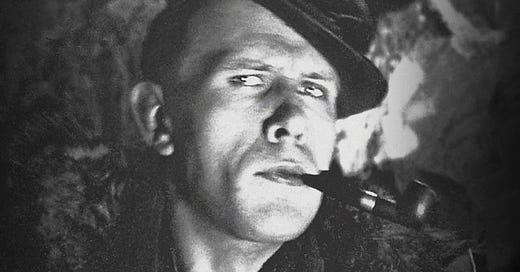


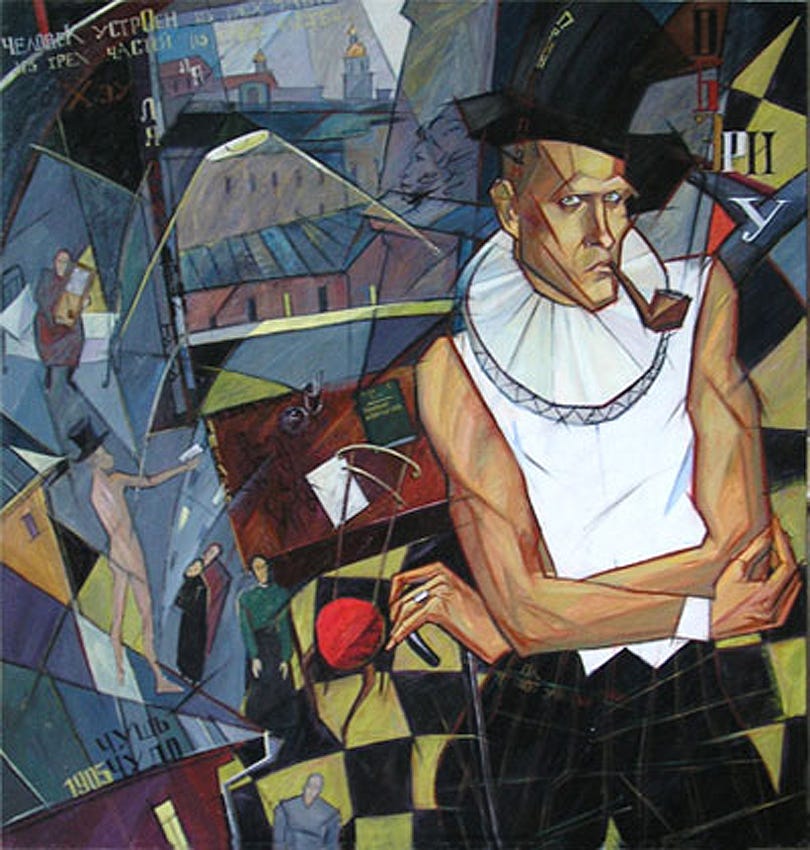
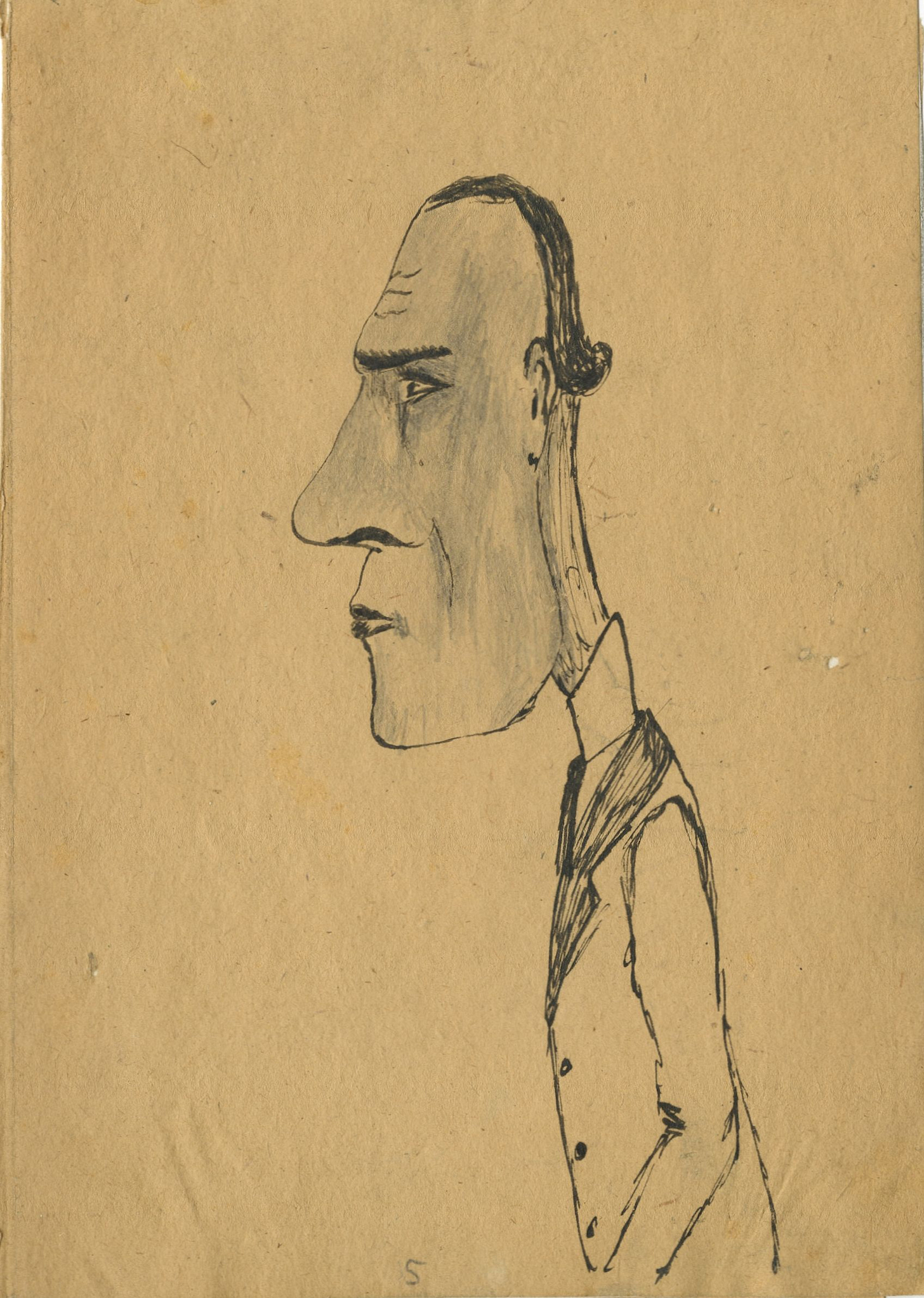
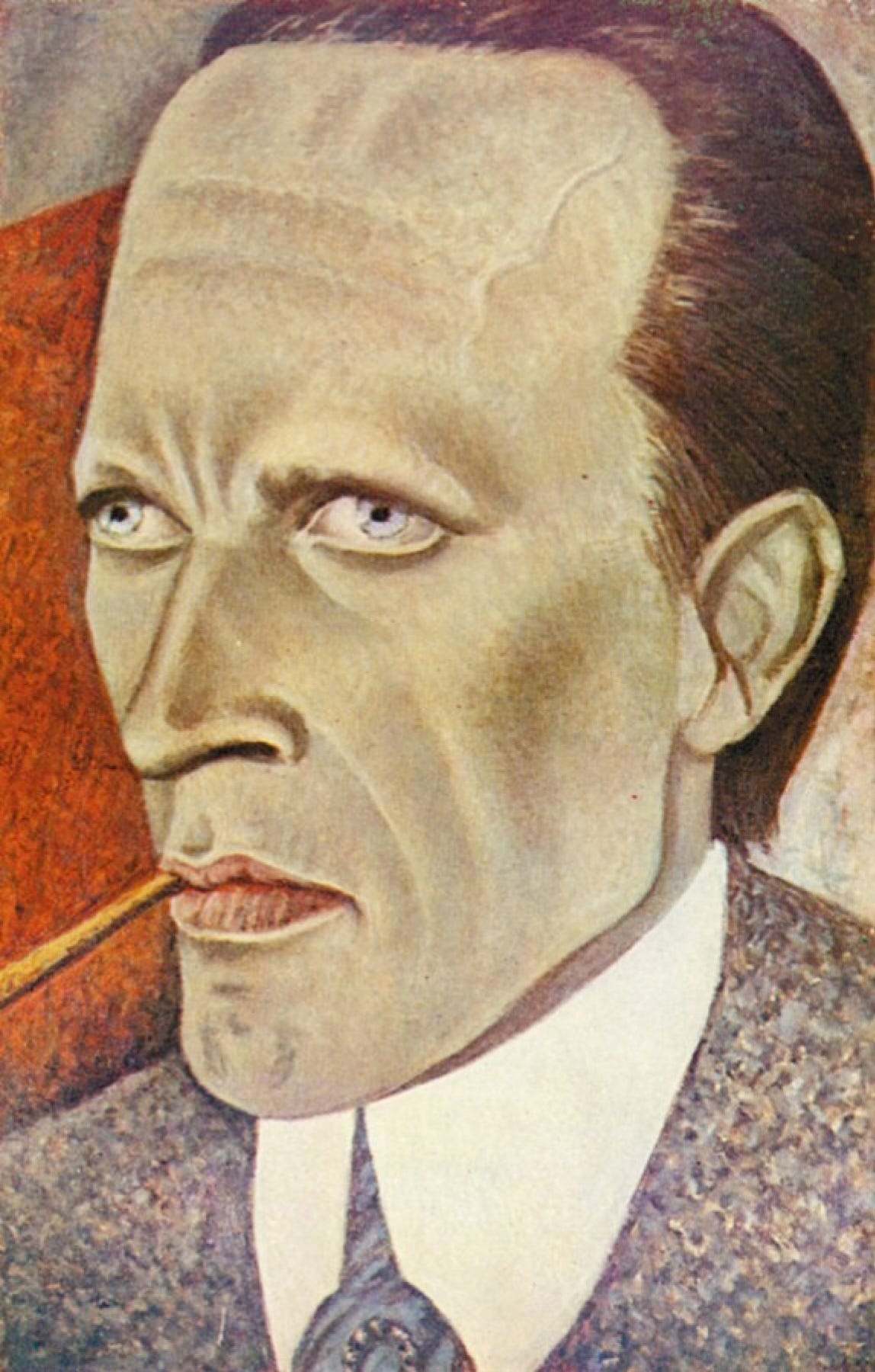
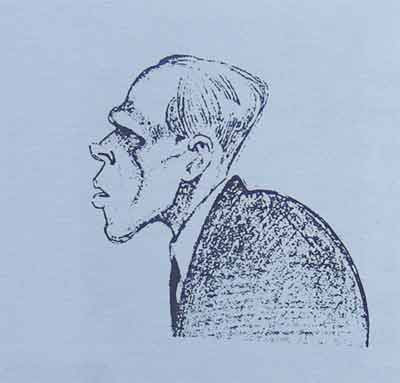

This is wonderful, and heartbreaking. Thank you.
One of the biggest inspirations as well